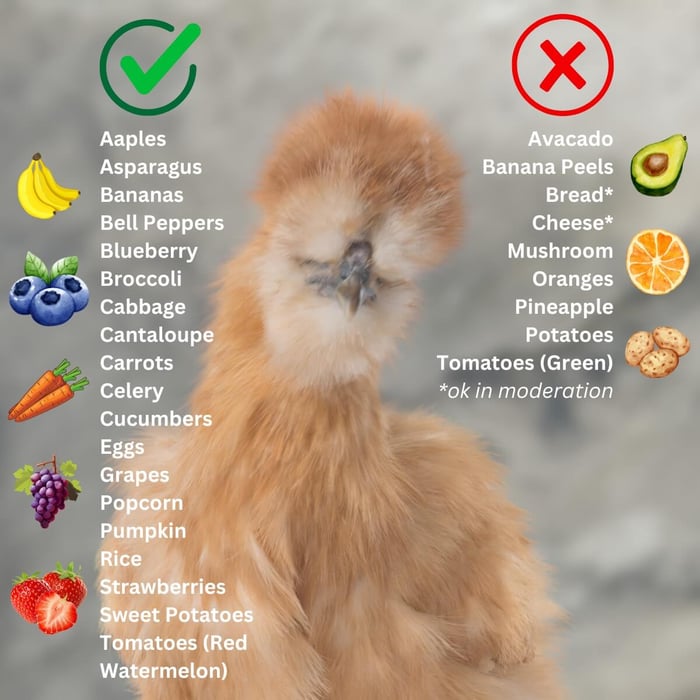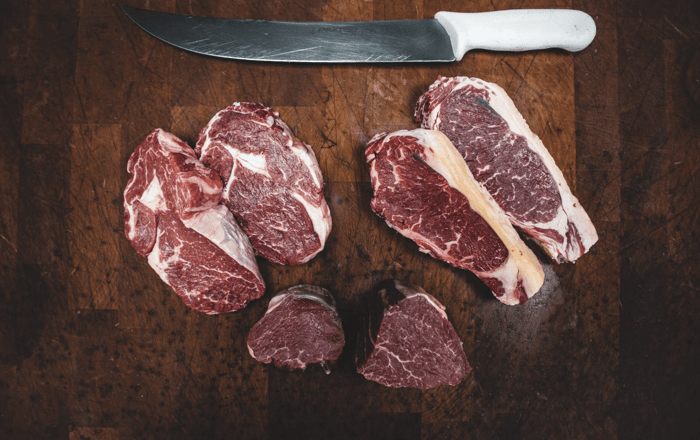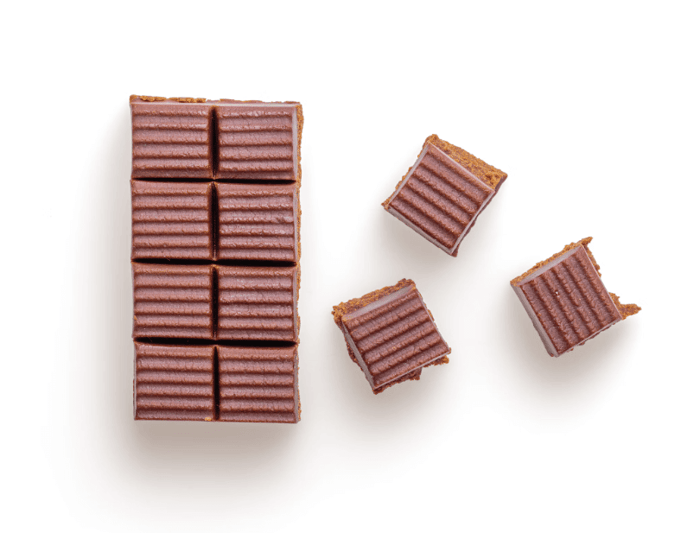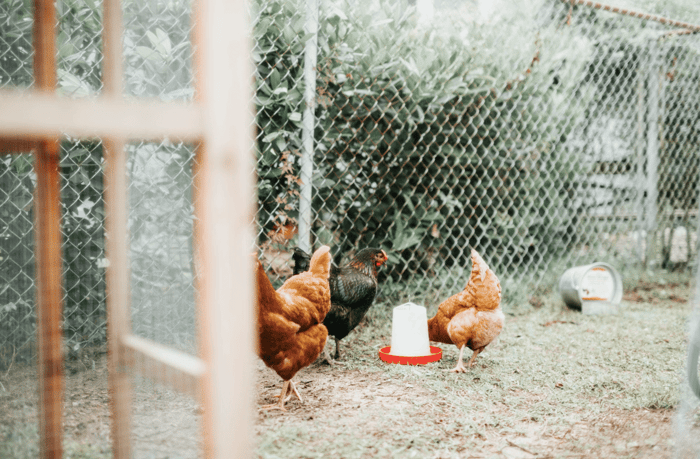What Scraps Do Chickens Eat?
Like us, you may have excess produce scraps that you don't know what to do with and would normally throw away. We love raising backyard chickens at our home here in Minnesota, and part of the fun is feeding them and seeing their reaction. Understanding what chickens eat and ensuring they get the right nutrients can prevent health issues and boost their egg production. If you're looking for what not to feed chickens we can help you out there too. This guide explores what food scraps chickens can eat making sure you don't poison on cause issues for your flock. Let's jump in.
Importance of Understanding a Chicken's Diet
Feeding chickens isn't as simple as tossing them scraps from the table. When we're talking about what do chickens eat, their diet impacts their health, egg quality, and lifespan. Chickens thrive on a balanced diet mimicking their natural foraging habits, which is why knowing the safe and nutritious options is important.
A proper diet not only enhances chickens' immune systems but also supports feather health and egg production. Understanding whether chickens can eat onions or tomatoes is vital. While some foods are beneficial, others can be harmful. Let's explore the essentials of a chicken's diet to optimize their well-being.
Ensuring that your chickens receive various nutrients will lead to happier and more productive birds. This guide will help you identify which food scraps are safe to feed and how to incorporate them into their diet.
Essential Nutrients for Chickens
Chickens require a range of nutrients to maintain their health. Proteins, carbohydrates, vitamins, and minerals are critical components. Without these, chickens can become malnourished or suffer from various health issues.
Protein is essential for growth and egg production. It aids in muscle development and helps produce eggs with sturdy shells. Carbohydrates provide energy, while vitamins and minerals support overall health and the immune system. Foods like grains and leafy greens can supply these nutrients, but balance is key.
Calcium is another vital nutrient crucial for strong eggshells. It's typically provided through oyster shells or specific feeds, ensuring hens lay consistently robust eggs. Understanding how to balance these nutrients is pivotal for your flock's vitality.
Safe and Healthy Food Options
 Chickens appreciate variety, and offering diverse scraps can enrich their diet. Let's look at some safe options, and I'll put my own experience down in some pro-tips to guide you.
Chickens appreciate variety, and offering diverse scraps can enrich their diet. Let's look at some safe options, and I'll put my own experience down in some pro-tips to guide you.
Can Chickens Eat Apples?
Chickens love apples and think they are delightful which is great as apples are good for them. These juicy fruits are packed with vitamins A and C, as well as fiber, which can contribute to your flock's overall health and vitality.
DANNY'S PRO TIP: Apples must be prepared carefully before being served to your feathered friends. Make sure to remove the seeds and core, as the seeds contain small amounts of cyanide, which can harm chickens if consumed in large quantities. By slicing the apples into manageable pieces and discarding the seeds, you can ensure your chickens enjoy the benefits of this tasty treat without any risk.
So go ahead, toss them a few apple slices, and watch them peck away in delight!
Can Chickens Eat Asparagus?
Chickens can certainly munch on asparagus, adding a nutritious twist to their diet, but it can be hard on their stomachs. It's best to offer asparagus as a treat rather than a staple, ensuring they enjoy its benefits without any tummy troubles.
DANNY'S PRO TIP: Does asparagus make your pee stink? Don't worry we're not trying to get personal, but asparagus can actually change the flavor of your hen's eggs, so only offer it in moderation.
This green vegetable is a great source of vitamins A, C, and K, along with essential minerals like iron and potassium, which support the overall well-being of your flock. As noted above too much can be bad for a chicken's digestive system and cause loose stools or egg taste changes. With a careful balance, your chickens can savor the taste of asparagus while staying happy and healthy.
Can Chickens Eat Bananas?
Chickens can certainly enjoy bananas as a delightful treat, adding a tropical flair to their diet. These creamy fruits provide a good dose of potassium, which supports muscle function, and vitamins B6 and C, promoting overall health for your feathered friends.
DANNY'S PRO TIP: Bananas are high in sugar, so they should be given in moderation. Too many bananas might lead to digestive issues or an imbalance in your flock's diet, especially if they start favoring these sugary snacks over their regular feed.
By offering small banana slices occasionally, you can treat your chickens to this tasty fruit while keeping them healthy and content. Watch them peck away gleefully, savoring each bite!
Can Chickens Eat Bell Peppers?
Chickens can indeed enjoy bell peppers as a colorful and nutritious addition to their diet. These vibrant vegetables are packed with vitamins A and C, along with a bounty of antioxidants that contribute to the overall health of your flock. Offering bell peppers can be a delightful way to keep your chickens' meals exciting and beneficial.
DANNY'S PRO TIP: It's crucial to be cautious with the inedible parts of the pepper plant. The leaves and stems contain compounds that could be toxic if ingested, so it's best to stick to the sweet, crunchy flesh.
By serving bell peppers in moderation, you can provide your chickens with a tasty treat that supports their well-being while avoiding any potential hazards. Enjoy watching them peck enthusiastically at these colorful delights!
Can Chickens Eat Blueberries?
Chickens can certainly indulge in blueberries as a tasty and nutritious treat, bringing a burst of flavor and health benefits to their diet. These tiny berries are packed with antioxidants and vitamins C and K, which can help boost your chickens' immune system and overall vitality. However, due to their natural sugar content, it's wise to serve blueberries in moderation, ensuring they don't disrupt the balance of your flock's regular diet. Offering a handful of blueberries now and then can keep your chickens pecking happily and healthily, while adding a delightful variety to their meals. Watch as they eagerly chase after these juicy morsels, enjoying each sweet bite!
Can Chickens Eat Broccoli?
Chickens love to munch on broccoli, making it a delightful and nutritious addition to their diet. This crunchy green vegetable is rich in vitamins A, C, and K, as well as dietary fiber, which can help support your flock's overall health and digestion.
DANNY'S PRO TIP: Introduce broccoli gradually, as a sudden change in diet might cause digestive upset for your flock. By offering small amounts initially and observing how your chickens react, you can ensure they enjoy the benefits of this tasty vegetable without any tummy troubles.
So, next time you're preparing a meal, don't hesitate to share a few broccoli florets with your girls (or boys) and watch them peck away happily!
Can Chickens Eat Cabbage?
Most chickens will enjoy cabbage as a crunchy and nutritious treat. This leafy vegetable is packed with vitamins like C and K, along with dietary fiber that can aid in digestion and support your flock's overall health. However, it's essential to serve cabbage in moderation. Too much cabbage might lead to digestive issues, so offering it as an occasional treat rather than a staple is a good practice.
DANNY'S PRO TIP: Tear the cabbage into manageable pieces, making it easier for your chickens to peck and enjoy every bite.
Can Chickens Eat Cantaloupe?
Chickens can delight in cantaloupe as a refreshing and nutritious treat, perfect for adding a splash of hydration to their diet. This juicy melon is rich in vitamins A and C, which can help boost your flock's immune system and overall health.
DANNY'S PRO TIP: Before serving, remove the seeds, as they can pose a choking hazard. Due to its natural sugar content, it's also a good idea to serve cantaloupe in moderation.
By slicing the cantaloupe into manageable pieces, you can create an enjoyable snack that keeps your chickens pecking happily, savoring every sweet, juicy bite while ensuring they stay healthy and balanced.
Can Chickens Eat Carrots?
Chickens can certainly nibble on carrots, making them a vibrant and nutritious addition to their diet. These crunchy orange vegetables are packed with vitamins, such as A and C, and are a good source of dietary fiber, which can aid in digestion and support overall health.
DANNY'S PRO TIP: Chop the carrots into small, manageable pieces to prevent any choking hazards.
By serving carrots in this way, you can provide your chickens with a tasty and beneficial treat that keeps them pecking happily, enjoying the natural sweetness and crunch that carrots bring to their meals.
Can Chickens Eat Celery?
Chickens can certainly enjoy celery as a refreshing and nutritious snack. This crunchy green vegetable is rich in water content, provides excellent hydration, and is a good source of dietary fiber, aiding digestion and promoting your flock's overall health. However, it's essential to chop celery into small, manageable pieces to avoid any choking hazards.
Can Chickens Eat Cucumbers?
Chickens can certainly enjoy cucumbers as a refreshing and hydrating treat. Packed with water and essential vitamins like K and C, cucumbers can help keep your flock cool and healthy, especially during hot weather. However, it's important to serve cucumbers in moderation, as their high water content could lead to digestive upset if consumed in large amounts. Consider slicing the cucumbers into manageable pieces to make it easier for your chickens to enjoy.
Can Chickens Eat Eggs?
Chickens can indeed enjoy eggs as a nutritious treat. They offer a hearty boost of protein and vital nutrients that support their growth and overall well-being.
DANNY'S PRO TIP: We like to eat eggs, and when we serve eggs to our chickens we certainly don't want to get them in the habit. It's crucial to serve the eggs cooked. Scrambled or boiled eggs can be an excellent way to introduce this protein-rich food into their diet without encouraging them to peck at their own fresh eggs.
By offering cooked eggs in moderation, you provide your flock with a wholesome snack that enhances their diet while maintaining the integrity of your egg-laying operation.
Can Chickens Eat Grapes?
Chickens can certainly enjoy grapes as a delightful and nutritious treat. These juicy morsels are packed with vitamins and antioxidants, which can enhance your flock's health and vitality. However, due to their size and potential choking hazard, it's important to cut the grapes into smaller pieces before serving them to your chickens. This simple step ensures that your feathered friends can safely savor the sweet, juicy goodness without any risk. By offering grapes in moderation, you can provide a tasty snack that not only satisfies their pecking curiosity but also contributes to their overall well-being.
Can Chickens Eat Popcorn
Chickens can indeed enjoy plain, unsalted popcorn as a fun and occasional treat. This fluffy snack offers a bit of fiber that can be a delightful change of pace from their usual fare.
DANNY'S PRO TIP: It's essential to keep popcorn plain so avoid adding butter, salt, or any seasonings, as these can be harmful to your flock.
When serving popcorn, ensure that it is fully popped to prevent any digestive issues.
Can Chickens Eat Pumpkin
Chickens can certainly enjoy pumpkin as a nutritious addition to their diet. This vibrant orange squash is packed with vitamins such as A and C and provides a good source of fiber, benefiting your flock's digestive health. Both the flesh and seeds are safe for chickens to eat, offering a tasty treat that can break up their usual diet routine. However, serving pumpkin in moderation is essential, as too much can lead to digestive upset.
Can Chickens Eat Rice
Chickens can enjoy cooked rice as a safe and satisfying treat, adding a bit of variety to their daily diet. This simple grain is a great source of carbohydrates, giving your flock a quick energy boost to fuel their lively antics.
DANNY'S PRO TIP: Serve fully cooked and plain rice and avoid any added salt, seasonings, or oils that could upset your chicken's delicate digestive systems. By offering this easy-to-prepare treat in moderation, you can provide your chickens with a delightful snack that fills their bellies and keeps them happy and healthy as they go about their pecking day.
Can Chickens Eat Strawberries
Chickens can definitely indulge in strawberries as a delicious and nutritious treat. These vibrant berries are packed with vitamins, such as vitamin C, and antioxidants that help boost your flock's overall health and vitality. However, because strawberries contain natural sugars, it's important to offer them in moderation to prevent any digestive upset. Always make sure the strawberries are clean and free from pesticides before serving them to your chickens.
Can Chickens Eat Sweet Potatoes
Chickens can certainly enjoy sweet potatoes as a nutritious addition to their diet, but it's important to serve them cooked. This root vegetable is rich in vitamins like A and C, as well as fiber, which can support your flock's health and digestion. Cooking the sweet potatoes softens them, making it easier for chickens to eat and digest. Be sure to avoid any added seasonings, oils, or sugar that could upset their stomachs.
Can Chickens Eat Tomatoes (Red)
Chickens can enjoy ripe tomatoes as a delightful and healthy treat, enriching their diet with vitamins such as C and K, along with providing much-needed hydration, especially during hot weather. These juicy red fruits can add a splash of color to their meals and are generally safe for chickens to eat.
DANNY'S PRO TIP: Ensure the tomatoes are fully ripe before serving them. The green parts of the tomato plant, including unripe tomatoes and leaves, contain solanine, which can be toxic to chickens.
Offering ripe tomatoes in moderation can keep your flock happy and healthy, adding a refreshing twist to their pecking routine.
Can Chickens Eat Watermelon
Chickens can delight in watermelon as a refreshing and hydrating treat, especially on warm days. This juicy fruit is packed with vitamins A and C, as well as antioxidants that can support your flock's overall well-being. While chickens can enjoy the sweet flesh of watermelon, it's important to serve it in moderation due to its high sugar content. Additionally, take care to remove the seeds, as they could pose a choking hazard.
Grains and Proteins
Incorporating grains such as oats, barley, and corn into your chickens' diet is beneficial. These provide energy and support healthy weight maintenance. Grains can be served whole or cracked to make them easier to digest.
Proteins are essential, so consider scraps like cooked eggs or mealworms. These provide a protein boost crucial for growth and egg production. Be cautious with meat scraps, ensuring they're cooked and free of seasoning to prevent health issues.
Feeding Guidelines
Understanding how much and how often to feed chickens is crucial. Overfeeding can lead to obesity, while underfeeding may cause nutritional deficiencies. A balanced approach is key.
Typically, chickens need a diet comprising 90% formulated feed and 10% treats from kitchen scraps. Introduce new foods gradually, observing their reaction to ensure they don't develop digestive issues.
Offer food twice daily, and remove any uneaten scraps to prevent spoilage. Fresh water should always be available, as hydration is equally important. Regularly cleaning feeders and waterers helps maintain hygiene and prevent disease.
Role of Diet in Chicken Health and Well-being
A balanced diet is indispensable for maintaining your chickens' health. It prevents diseases, supports egg production, and keeps them active. By understanding what chickens can eat, you ensure they receive the nutrients necessary for a long, productive life.
Providing a diverse diet reflects their natural foraging behavior, enhancing their physical and mental well-being. You'll notice improved feather condition and overall vitality with the right balance.
What Can Chickens Eat Printable List?
Download our what do chickens eat printable list and put it on your fridge or somewhere you can easily remember the do's and don'ts of feeding your flock.
We invite backyard chicken owners to share their feeding tips or ask questions in the comments below. Your experiences could help others in our community provide the best care for their feathered friends. Happy feeding!






